ADSactly Comedy: Monty Python
Now, I’ve been a comedy lover for a long time and I figured it was time to share this passion of mine with all you @adsactly readers. Recently, this blog featured a great post on the comedic duo Laurel&Hardy, definitely among the forefathers of the comedy genre.
And I thought it would be interesting if we took it a step further and explored the evolution of comedy (chiefly American and British) in the time since.
It’s practically impossible that you’ve lived on this Earth for as long as you have and not have heard at least one reference to Monty Python. Be it a ‘this parrot is no more’ to a ‘what have so-and-so ever done for us’ to a ‘I fart in your general direction’ gag, you’ve probably heart of the legendary comedy troupe.
And maybe you know of them, but don’t really know who they were, what they meant to comedy and why you should drop whatever you’re doing and go watch a Monty Python movie right now. Seriously, stop reading this post and go watch ‘Life of Brian’. I’ll wait here.
Are you back? Good. I would ask if you enjoyed yourself, but that is pretty much guaranteed with Monty Python. Now, I won’t give you a history lesson, won’t tell you that the Pythons found each other in England’s top schools (aka Oxford and Cambridge) in the 1960s or that they collaborated before on different skit shows, such as ‘At Last the 1948 Show’. Except I already have.
Oh well. But let’s get back to Python.
Monty Python consisted of John Cleese, Terry Gilliam, Terry Jones, Michael Palin, Eric Idle and Graham Chapman. They formed in 1969 and were to comedy what the Beatles were to music. Yes, they were that big. And it’s hard to put your finger on it and say exactly what made them so popular, but the truth is, they worked. They were different from the other TV programs of the era.
The main issue that the Pythons found in other comedy shows was that the writers struggled to hard to find a punchline that was on the same level with the quality of the rest of the sketch and often, the “bad” punchline would detract from overall quality. So, the Pythons decided to change that. They would frequently abandon strong sketches in the middle of the action and not bother with finding a “proper ending”.
The famous ‘Argument Clinic’ sketch ends on just such a note, when a policeman comes in to arrest the actors for confusing the audience and not ending with a proper punchline. Then, of course, we had the black night who would wander in ever so often and hit the characters over the head with a rubber duck. There were the John Cleese classic announcements of ‘and now for something completely different’. The possibilities were endless, and the Pythons definitely had their fun with that.
But the problem here was that other comedy actors were starting to catch on to the same trick. Comedy legend Spike Milligan (whom we will talk about in another installment) also began abandoning sketches halfway through, which was a bit of a problem for the Pythons, as Milligan was already “someone” whereas they were unknown.
Which pushed the Pythons to experiment further, to look for new ways in which they might improve their ‘Flying Circus’, and so it was they decided to include Terry Gilliam’s brilliant animations into the show. Sometimes vulgar, often riddled with deep, snarky commentary about current events, Gilliam’s stream-of-consciousness animation style really defined the Pythons and helped put them in a league of their own. Obviously, great writing, surreal ideas, excruciatingly funny gags and charming acting also helped.
Monty Python rapidly became a phenomenon, not only in Britain, but worldwide. Even UK Prime Minister Margaret Thatcher once quoted the dead parrot sketch in a speech – they were that big.
But of course, with great fame also came great conflict, particularly between Cleese and Chapman.
Now one of the most beloved figures in British comedy, John Cleese was said to be ‘difficult to work with’ and at one point during the third season of ‘Monty Python’s Flying Circus’, he announced he was tired and wanted out. The others carried on with the show for an extra half a season, but had to quit in the end, as it just wasn’t the same.
Thankfully, Monty Python did not end there. The troupe also wrote, directed and starred in three movies, as well as numerous live appearances.
There was ‘Monty Python and the Holy Grail’, an erratic, wildly absurd take on the King Arthur legend that spawned such classics as the Black Knight, the Knights Who Say ‘Ni’ and the deadly rabbit of Caerbannog.
Then, we have ‘Monty Python’s Meaning of Life’, which was much closer in style to the original ‘Flying Circus’, jumping in time through a series of sketches that dealt with such universal subjects as birth, love, death, adulthood, sex etc.
And then, in-between these two, there was ‘Monty Python’s Life of Brian’, by far the best of their movies. A parody of the original Bible story, ‘Life of Brian’ followed the adventures of said Brian, a hapless young man born at the same time as Jesus, but in the stall next door. As the movie progresses, Brian falls in with a rebel group, the People’s Front of Judea, who are more invested in the idea of revolution than in the actual thing.
He then is mistaken for Jesus Christ, followed around by masses of people, arrested and crucified. The film is a cinematic staple as well as a benchmark moment in comedy history.
As it happens, it was largely financed by Beatle George Harrison, a close friend of Eric Idle. Here’s what Idle had to say on the subject, when inducting Harrison posthumously into the Hollywood Bowl Hall of Fame:
When they told me they were going to induct my friend George Harrison into the Hollywood Bowl Hall of Fame posthumously: my first thought was - I bet he won't show up. [...] He put Monty Python on here at The Hollywood Bowl, and he paid for the movie The Life of Brian, because he wanted to see it. Still the most anybody has ever paid for a Cinema ticket.
In my opinion, this quote is just a snippet into the phenomenally funny minds that created Monty Python and changed comedy forever.
And the main thing, for generations that came afterward, was that the Pythons told wannabe actors and comedians that they could do anything. They could be crazy, they could flick it to the system (and the BBC), they didn’t have to follow a structure or be tame. And it was great and we should really be grateful to them, because they changed the world we live in. So much.
After Python
Sadly, Monty Python ended their ‘tenure’ in the mid-to-late eighties, even though they continued to collaborate with one another.
Unsurprisingly, they created great things in their solo careers as well, and even though none matched Python itself, let’s have a look at some.
In the mid-seventies, there was John Cleese’s Fawlty Towers, a short series that centered around a hapless, eccentric hotel manager in the English town of Torquay (played by Cleese himself). The series was, I believe, the most successful solo project of a Python to date and many of its antics, such as the hopeless Spanish waiter, Manuel or the classic quote “don’t mention the war” have stayed in the memory of comedy lovers.
Terry Gilliam went on to direct amazing movies such as ‘Brazil’ and ‘Fear and Loathing… in Las Vegas’ (based on the Hunter S. Thompson book of the same name). Michael Palin and Terry Jones collaborated on the ‘Ripping Yarns’ series. Afterward, Palin focused on writing books and doing travel documentaries (he was recently Knighted) and Jones on directing.
Eric Idle pursued a more musical career and made it big-time when he wrote the Pythonesque musical ‘Spamalot’ (based on a Python sketch), which proved to be phenomenally successful.
Tragically, Graham Chapman didn’t get to enjoy much of a solo career. He collaborated with some of the other Pythons, as well as other comedic greats, such as Douglas Adams. He was diagnosed with cancer in 1988 and died the following year.
Although the remaining Pythons have reunited on various occasions since ‘The Meaning of Life’, most recently in 2014, for a series of live shows (which were mindblowing, given that all the Pythons were by then in their 70s), it is unlikely there will be any further reunions.
I honestly believe comedy as we know it today would not exist without Monty Python. As we will see later in this series, they inspired dozens of young people who became comedy icons in their own right.
What’s your favorite Python sketch/movie/quote?
Authored by @honeydue
Click on the coin to join our Discord Chat

Witness proposal is here:
Go To Steem Witness Page
In the bottom of the page type: adsactly-witness and press vote.

Use small letters and no "@" sign. Or, click here to vote directly!
Thank you!
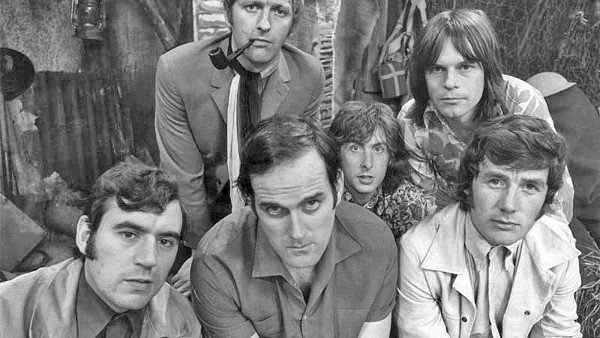

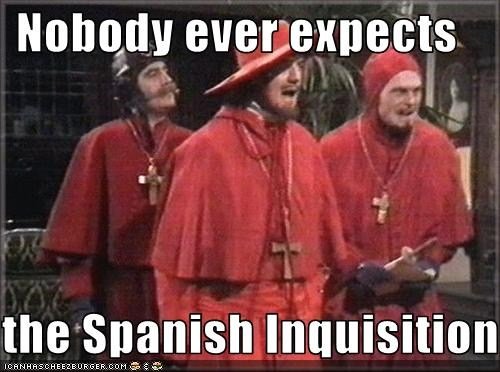
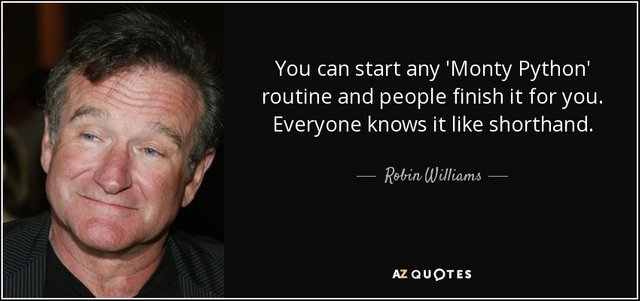
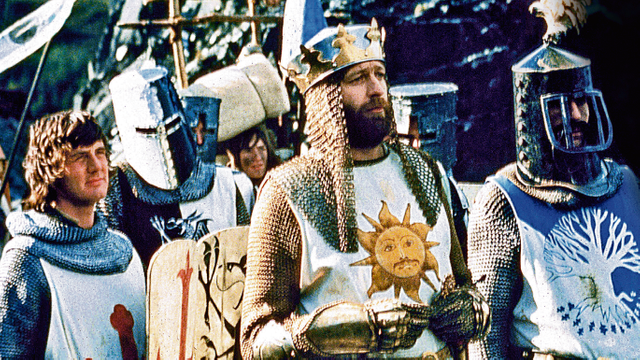
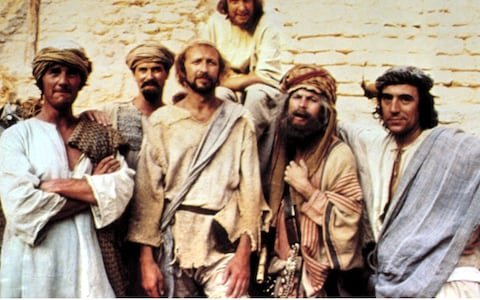

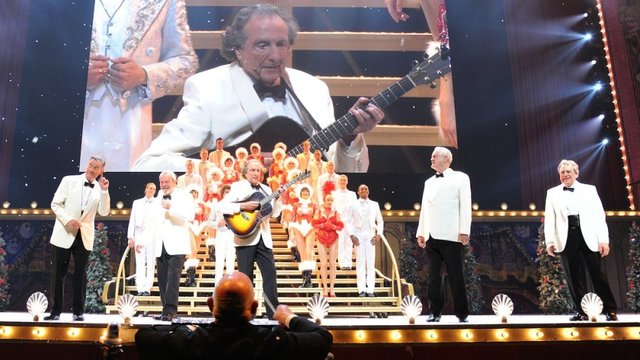
The Holy Grail blew my mind.
Muuuch respect to these guys 💪⚡👍
Posted using Partiko Android
Same here :D Love MP :)
As a follower of @followforupvotes this post has been randomly selected and upvoted! Enjoy your upvote and have a great day!
Nice! I just ordered Life of Brian on Bluray the other day and I think its supposed to get here tomorrow.
I was introduced to Monty Python at a very young age and while it isn't my main go-to, it is always special to me for that reason.
"I honestly believe comedy as we know it today would not exist without Monty Python."
Truth.
Lovely, enjoy it! :D I was lucky enough to find them when I was really young, too and they really shaped the way I think and talk .For the better, obviously. Don't wanna imagine what I'd be like without MP :D Much duller, surely.
I've always found British humour to be very exquisite and intelligent. I didn't know this show or this group of comedians, but from what you say, they marked a whole era. In particular, I've always been curious to know which comedy program started the idea of having laughs and applause heard in comedies or which program created the idea of doing short sketches with different characters. Watching Monty Python's videos, I remembered a cult, critical, ironic and scathing comedy, which I love and which also satirizes British society: Little Britain. I love that comedy! It's a pity that, like all good things, it's over. Greetings, @honeydue
Greetings, @honeydue. Excellent publication. It's interesting to know that Monty Python was a British comedy phenomenon and a great school for comedians. I had already been recommended 'Brian's Life', I could only see some fragments on youtube, but I will look for a way to see this complete film that was a box-office success. Thank you for bringing this post with quality content for @adsactly readers.
I was a follower of the Monty Pythons. I could see several of their accomplishments. I own in dvd The life of Brian and The meaning of life. Although the first one seems to me of a special quality because of its sarcastic humour, my favourite is The meaning of life, because it not only brings together irony and humour, but also a metafictional sense, which interests me a lot among the features of art in general.
In my city I directed a cinema club with a large hall, "Ocho y medio" was called. We exhibited several of his films there. There was a unique experience with the audience when we presented The meaning of life, because because of its burlesque and self-referential game, at first, it was believed that the projectionist had made the wrong roll of film. But it was part of the film.
Then I followed the individual realizations, particularly those of Terry Gilliam. Of all that he did, I have a special appreciation for Brazil and Twelve monkeys.
The Monty Python were great, and they made very important contributions to contemporary cinema.
Thanks for your good post, @honeydue.
I laughed until I cried with the Monty Python movies. An irreverent humor with nuances of irony. It is intelligent comedy for all audiences. Everyone will enjoy according to their referents. I think that sarcasm, at times, did not help his films were blockbusters, but he did captivate an audience that needed to hear jokes about contemporary life.
His cinematographic work is a school of trial and error that sought to find the balance between quality and humor. In my view they did, especially when I think of "The meaning of life" and "Life of Brian."
Excellent publication @honeydue. Applause for you and the Monty Python. Bravo @adsactly, a live for the cinema.